《英语泛读教程2》教案
- 格式:doc
- 大小:114.50 KB
- 文档页数:10

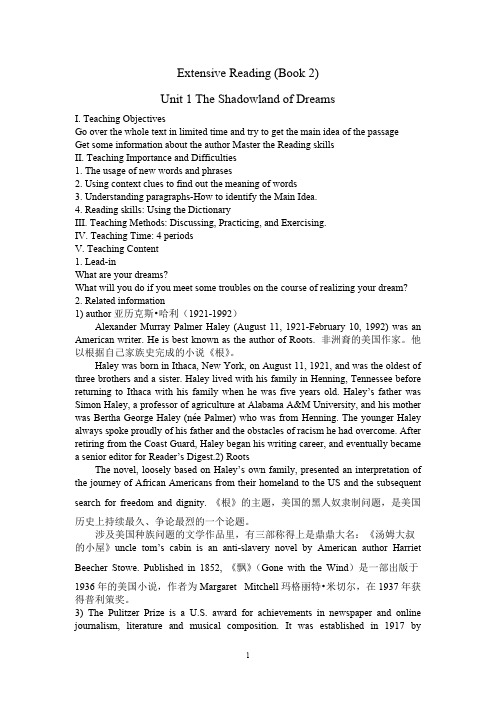
Extensive Reading (Book 2)Unit 1 The Shadowland of DreamsI. Teaching ObjectivesGo over the whole text in limited time and try to get the main idea of the passage Get some information about the author Master the Reading skillsII. Teaching Importance and Difficulties1. The usage of new words and phrases2. Using context clues to find out the meaning of words3. Understanding paragraphs-How to identify the Main Idea.4. Reading skills: Using the DictionaryIII. Teaching Methods: Discussing, Practicing, and Exercising.IV. Teaching Time: 4 periodsV. Teaching Content1. Lead-inWhat are your dreams?What will you do if you meet some troubles on the course of realizing your dream? 2. Related information1) author亚历克斯•哈利(1921-1992)Alexander Murray Palmer Haley (August 11, 1921-February 10, 1992) was an American writer. He is best known as the author of Roots. 非洲裔的美国作家。

一、教学目的与要求泛读课并非仅仅让学生大量而广泛地阅读课外读物,教师要有意识地培养学生的正确理解语篇的能力,加强学生阅读技能的训练和阅读能力的培养,巩固学生的语音、词汇、句法等基本语言能力,扩充学生的文化知识背景,同时也要增强学生的认知能力、逻辑思维能力等从而使学生达到英语专业四级的考试要求。
1. 加强基础知识词汇和语法是学好英语的关键。
要扩大学生词汇量,教师可以要求学生通过大量阅读来熟悉掌握词汇;其次,可以向学生介绍一些记忆单词和在阅读中猜测词的方法,如:利用构词法、词类归纳法、联想法等记忆单词;利用上下文、同义词、反义词、举例、等猜测词义;另外教师可以要求学生运用阅读中出现的新词汇来进行写作,以促使学生更加有效地掌握所学词汇。
2. 培养阅读技能阅读速度是反映语言能力和衡量阅读水平的重要标志。
泛读课教学的一个重要的任务是教授学生阅读方法,训练各项阅读技能,努力引导学生养成组视阅读、集中关键词阅读、抓主题句阅读、利用词缀和上下文推测词义阅读以及用外文思维阅读等良好习惯,来培养学生的阅读速度。
此外可以训练其它的一些技巧,如略读法,即通篇浏览,了解文章大意和中心内容;寻读法,即有目的地寻找文章的主要信息;评论阅读法,即弄清作者在文章中表露出来的态度和倾向,对其主要观点加以评论。
3. 扩大知识面泛读课中的阅读材料,题材广泛、体裁多样,涉及各个学科、各个领域的知识。
教师可提前要求学生预习有关主题,从网络或资料中查阅相关的背景文化知识,这样既可提高学生对语篇内容的熟悉度,免得教师占用大量的课堂时间进行冗长的背景知识介绍,又可避免扼杀语篇的交际性和学生的阅读兴趣。
课堂上教师再适当地补充介绍相关的历史、政治、背景知识、重要人物、名作家及作品等知识,为学生推荐一些好的课外阅读材料,鼓励学生进行大量课外阅读,使其尽可能多地接触到丰富多样的真实的语言运用场境,拓展他们的各种图式结构。
二、教材及参考书1.教材:《英语泛读教程》2.参考书:《古希腊罗马神话与西方民间传说》《傲慢与偏见》《希腊罗马神话及典故成语》《西洋圣典·古希腊罗马神话》《希腊罗马神话词典》三、授课单元及学时分配本课程共8个教学单元,按每教学单元4课时分配。

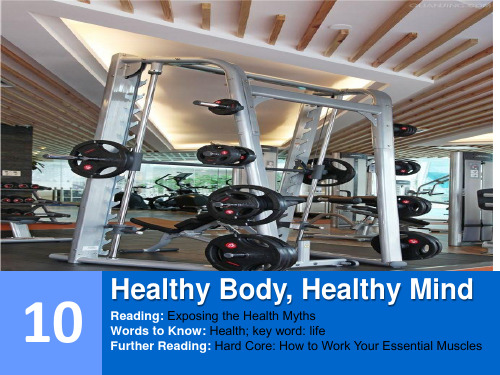

Extensive Reading (Book 2)Unit 1 The Shadowland of DreamsI. Teaching ObjectivesGo over the whole text in limited time and try to get the main idea of the passage Get some information about the author Master the Reading skillsII. Teaching Importance and Difficulties1. The usage of new words and phrases2. Using context clues to find out the meaning of words3. Understanding paragraphs-How to identify the Main Idea.4. Reading skills: Using the DictionaryIII. Teaching Methods: Discussing, Practicing, and Exercising.IV. Teaching Time: 4 periodsV. Teaching Content1. Lead-inWhat are your dreams?What will you do if you meet some troubles on the course of realizing your dream? 2. Related information1) author亚历克斯•哈利(1921-1992)Alexander Murray Palmer Haley (August 11, 1921-February 10, 1992) was an American writer. He is best known as the author of Roots. 非洲裔的美国作家。
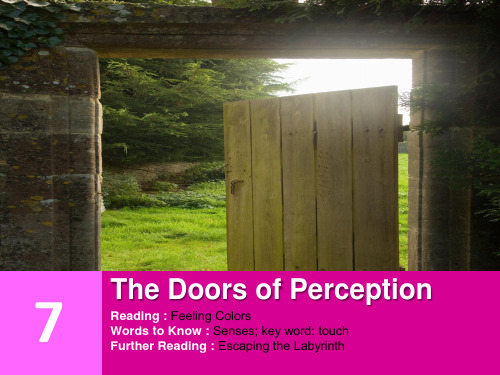

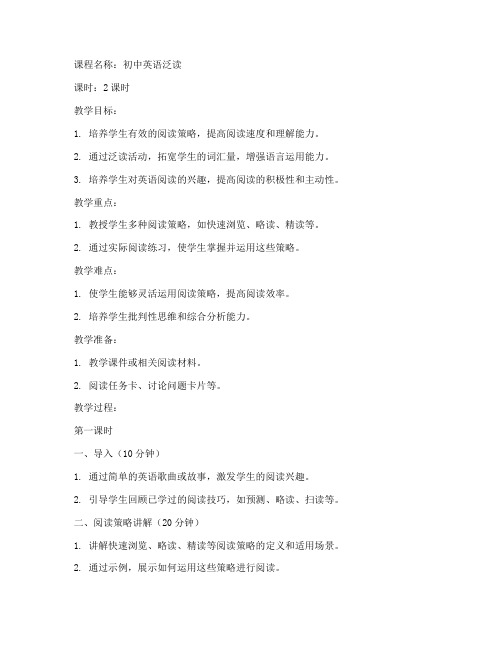
课程名称:初中英语泛读课时:2课时教学目标:1. 培养学生有效的阅读策略,提高阅读速度和理解能力。
2. 通过泛读活动,拓宽学生的词汇量,增强语言运用能力。
3. 培养学生对英语阅读的兴趣,提高阅读的积极性和主动性。
教学重点:1. 教授学生多种阅读策略,如快速浏览、略读、精读等。
2. 通过实际阅读练习,使学生掌握并运用这些策略。
教学难点:1. 使学生能够灵活运用阅读策略,提高阅读效率。
2. 培养学生批判性思维和综合分析能力。
教学准备:1. 教学课件或相关阅读材料。
2. 阅读任务卡、讨论问题卡片等。
教学过程:第一课时一、导入(10分钟)1. 通过简单的英语歌曲或故事,激发学生的阅读兴趣。
2. 引导学生回顾已学过的阅读技巧,如预测、略读、扫读等。
二、阅读策略讲解(20分钟)1. 讲解快速浏览、略读、精读等阅读策略的定义和适用场景。
2. 通过示例,展示如何运用这些策略进行阅读。
三、阅读实践(30分钟)1. 分组讨论:每组选择一篇阅读材料,运用所学策略进行阅读,并分享阅读心得。
2. 阅读任务卡:根据任务卡上的问题,引导学生进行深度阅读,并完成相应的练习。
四、总结与反思(10分钟)1. 学生分享阅读体验,总结阅读过程中的收获和困难。
2. 教师点评,总结本节课的重点内容,并对学生的阅读策略运用情况进行反馈。
第二课时一、复习与巩固(10分钟)1. 通过小测验或游戏,复习上一节课所学的阅读策略。
2. 学生展示自己在家阅读的成果,分享阅读材料。
二、阅读策略应用(30分钟)1. 教师提供一篇较长的阅读材料,要求学生运用所学策略进行阅读。
2. 学生分组进行讨论,分享阅读过程中的发现和疑问。
三、小组合作阅读(20分钟)1. 学生分组,每组选择一篇阅读材料,进行合作阅读。
2. 小组讨论阅读材料的主旨大意,并制作简要的阅读报告。
四、总结与评价(10分钟)1. 学生展示阅读报告,分享阅读体验和收获。
2. 教师对学生的阅读策略运用情况进行评价,并提出改进建议。
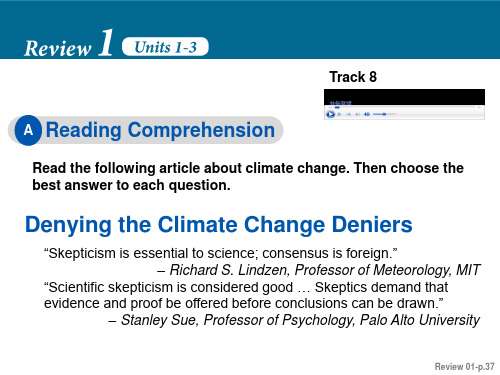
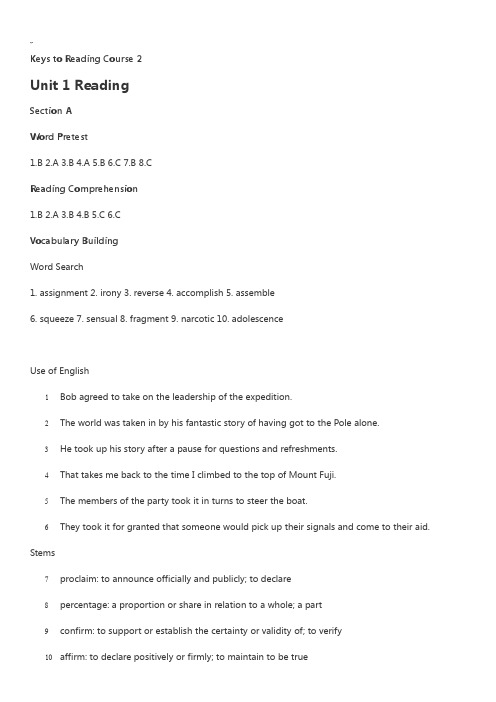
Keys to Reading Course 2Unit 1 ReadingSection AWord Pretest1.B2.A3.B4.A5.B6.C7.B8.CReading Comprehension1.B2.A3.B4.B5.C6.CVocabulary BuildingWord Search1. assignment2. irony3. reverse4. accomplish5. assemble6. squeeze7. sensual8. fragment9. narcotic 10. adolescenceUse of English1Bob agreed to take on the leadership of the expedition.2The world was taken in by his fantastic story of having got to the Pole alone.3He took up his story after a pause for questions and refreshments.4That takes me back to the time I climbed to the top of Mount Fuji.5The members of the party took it in turns to steer the boat.6They took it for granted that someone would pick up their signals and come to their aid. Stems7proclaim: to announce officially and publicly; to declare8percentage: a proportion or share in relation to a whole; a part9confirm: to support or establish the certainty or validity of; to verify10affirm: to declare positively or firmly; to maintain to be true11centigram: a metric unit of mass equal to one hundredth of a gram 12exclaim: to express or utter(something) suddenly or vehementlySynonyms1. adaptability2. purpose3.strained4.hold5.defeatClozeimportant second France student bilingualmonolingual serious means use difficultSection B1.F2.T3.T4.C5.A6.B7.B8.B9.B 10.T11.T 12.F 13.F 14.T 15.TSection C1.F2.T3.T4.F5.T6.F7.F8.F9.F 10.FUnit 2 MusicSection AWord Pretest1. B2. C3. B4. C5. B6. BReading comprehension1. T2. F3. T4. T5. T6. T7. T8. FVocabulary BuildingWord search1. folk2. capacity3. sensuous4. qualified5. abuse6. stuff7. mood8. clarity9. striveSemantic variations1. B2. B3. B4. B5. A6.BStems13compose: to make up the constituent parts of; to constitute or form 14contract: to reduce in size by drawing together, to shrink15dispose of: to get rid of, to throw out16impose: to obtrude or force( oneself, for example) on another or others 17subtract: to make away, to deduct18deposit: to put (money) in a bank or financial accountSynonyms1. discriminating2. widespread3. compatibility4. clearness5. association Clozemusic form south danceinterest instruments voice rootsSection B1. F2. T3. F4. F5. F6.T 7 T 8. F 9 F 10. F11. F 12. T 13. T 14. F 15 TSection C1. D2. A3. D4. D5.D6. D7. D8. AUnit 3 GenerationSection AWord Pretest1. C2. C3. B4. C5. B6. C7. C8. AReading Comprehension1. D2. C3. C4. A5. B6. C7. A8. BVocabulary BuildingWord search1. lull2. associate3. client4. utterly5. certificate6. rags7. jerk8. foreman9. demanding 10. sentimentalSemantic variations1. C2. C3. B4. A5. B6. CStems19transmit: to send from one person, thing, or place to another; to convey 20deduce: to reach (a conclusion) by reasoning21eject: to throw out forcefully; to expel22compel: to force, drive, or constrain23project: to thrust outward or forward24conduct: to lead or guideAntonyms1. hopeless2. disobedient3. weighty4. agree5. clearClozeactive girls skirts move raisedforce show fly hesitated planeSections B1. B2. C3. C4. B5. C6. C7. C8. C9. A 10.C 11. C 12. C 13. A 14. C 15. C Section C1. F2. T3. T4. T5. F6. F7. T8. F9. T 10. TUnit 4Section AWord Pretest1.D2.A3.A4.B5.A6.C7.A8.B9.D 10. CReading Comprehension1.B2.B3.B4.B5.C6.A7.BVocabulary BuildingWord Search1. slanting2. equator3. amplifier4. vapor5. desert6. latitude7. atlitude8. monsoon9. drain 10. precautionSemantic Variations1.A2.B3.C4.A5.C6.AStems25division: one of the parts, sections or groups into which something is divided26evident: easily see or understood; obvious27individual: a single human being considered apart from a society or community28sustain: to support from below; to keep from falling or sinking; to prop29visible: possible to see; perceptible to the eye30obtain: to succeed in gaining possession of as the result of planning or endeavor; to acquire Synonyms1. mixture2. eternal3.impact4.humidity5.remoteClozeradio incorrect predict misunderstandingunexplained happen up rightSection B1.B2.C3.A4.F5.T6.F7.F8.F9.T 10.C11.C 12.B 13.T 14.F 15.TSection C1.T2.T3.F4.T5.F6.T7.F8.T9.T 10.TUnit 5 WorkSection AWord Pretest1C 2A 3B 4 C 5 B 6 A 7 C 8 CReading Comprehension1-8 C A A C C BVocabulary BuildingWord Search1 intangible 2. crave 3 ego 4 attributable 5 stall 6 tool up 7 at stake 8. cram 9. forfeit 10. cornyUse of English31By the time I opened the can its contents had gone off.32I’ll go over how it works before you try it yourself.33I was told it would be repaired free of charge, but the man in the shop has gone back on his promise.34The book was so popular that there weren’t enough copies to go round.35His shop has gone out of business after making heavy losses.36The trade has gone from bad to worse and staff are being laid off. Stems1-6 BADAACSynonyms 1-5 graceful spontaneously oppose usual clientClozestaff maximize objectives participate potentialskills easier appointed specific commitmentSection B1-5 ACBFT 6-10 FACDB 11-15 CBTFTSection C1-5 FTFTF 6-10 TFTFTUnit 6 The African-AmericansSection AWord Pretest1. C2. A3. C4. A5. B6. A7. C8. CReading Comprehension1. F 2T 3T 4F 5T 6F 7T 8TVocabulary BuildingWord Search1. destined2. relief3. segregation4. boycott5. sit-in6. legacy7. chronicle8. assault9. plight 10. vigilanceSemantic Variations1C 2A 3C 4A 5B 6CStems1. evolution: the theory that groups of organisms change with passage of time, mainly as a result of natural selection, so that descendants differ morphologically and physiologically from their ancestors2. ascend: to go or move upward3. devolve: to pass on or delegate to another4. migrate: to change location periodically, especially by moving seasonally from one region to another5. export: to send or transport (a commodity, for example) abroad, especially for trade or sale6. condescend: to descend to the level of one considered inferior; to lower oneselfAntonyms1. observe2. admit3. dismiss4. eulogize5. advanceClozeNominated raised immigrated earned roseAssignment position army autobiography speakerSection B1T 2T 3F 4C 5B 6D 7D 8D 9T 10F11F 12F 13T 14TSection C1A 2D 3D 4C 5C 6B 7D 8CKeys to Reading Course 2Unit 7 Greek StoriesSection AWord Pretest1.C2.B3.D4.D5.A6.B7.B8.A9.C 10.CReading Comprehension1.B2.C3.C4.C5. C6.D7.C8.DVocabulary BuildingWord matchripple a little wave on the surface of watermischief naughty behavior by childrenhospitality welcoming behaviorbillow a large sea wavespell delightful influencenymph a goddess of natureband a group of musiciansuitor a man wishing to marry a particular woman mortal a human beingwarrior a soldiercrafty cunninghostile unfriendlymerry cheerfultame not wildcontent satisfiedresume to take againgloom darknessdespise to look down on with contemptdismay a strong feeling of fear, anxiety and hopelessnessdusk the time just before nightSemantic Variations1-6 CAAAACStems37tendency: movement or prevailing movement in a given direction2. conservative: favoring traditional views and values; tending to oppose change3. preserve: to keep in perfect or unaltered condition; tending to oppose change38valuable: of great importance39available: present and ready for use; at hand; accessible40prevail: to be most common or frequent; to be predominant Antonyms1. forbid2. clarify3.sorrow4.remain5.concealClozename place arrows wandered powermischief won neglected celebrate expeditionSection B1-5 CCACD 6-10 TTFFF 11-15 TTBBCSection C1-5 CADBA 6-8DCCUnit 8 Attitude Towards LifeSection AWord Pretest: BACBA BCAReading Comprehension: CABBC BBBVocabulary BuildingWord matchastonishing surprisingconsiderate thoughtful of other persons’wishes, needs or feelingspreach to advise or urge others to accept (sth. one believes in)strenuous taking or needing great effort or strengtharena an enclosed area for sports, public entertainments, etc.adversity bad fortune, troublebatter to damage, break, or cause to lose shapereverse the opposite, the other way roundpenetrate to see into or throughself-esteem one’s good opinion of one’s own worthdoom to cause to suffer sth unavoidable and terribleemerge to come out or appear from inside or from being hiddenblessing a gift from God or anything that brings happiness and good fortune mess up to get into disorder; to spoil, etc.devastating completely destructivecommon denominator a quality or belief shared by all the members of a group odds the probabilities that sth will or will not happenstack to arrange dishonestly so as to give oneself an unfair advantage motive to provide with a strong reason for doing sth.falter lose strength or effectiveness; weakenSemantic Variations: CBBACBStems1 prescribe to advise the use of a medicine2 description an account of a person in words3 terrain a stretch of land, with regard to its natural features4 subscribe to pay regularly in order to receive a magazine, newspaper, etc.5 territorial of a country’s territory6 extraterrestrial of or from outside the earth or its atmosphere Antonymsappear ready hide s skillful carelessClozeintelligent activities workout attitudeoff reducing seem asideSection BCCCCC TFTFT TTFFTSection CFTFTF TFTTTUnit 9 First AidSection AWord Pretest1.B.2.A.3.C4.B.5.B.6.B.7.B.8.A.9.C. 10.BReading comprehension1.B.2. C.3. D.4. B/D/A/C.5.C.6.C.7.A.8.C/A/B/DVocabulary BuildingWord Search1.ambulance2.urgent3.emergency4.massage5.yell6.vein7.artery8.fracture9.blister 10.tetanusUse of English1.The government has come in for a lot of criticism.2. It’s hard to come to terms with the government’s defense policy.3. After retiring in 1980 he has decided to make a comeback to the political scene.4. The situation has come to the boil now that the government has to face a vote of confidence.5. The tax cuts announced in the Budget do not come into effect until next year.6. The miners came out on strike against the government’s privatization plans.Stems41solo: a composition or passage for an individual voice or instrument, with or without accompaniment42series: a number of objects or events arranged or coming one after the other in succession 43isolate: to set apart or cut off from others44desert: to withdraw from, especially in spite of a responsibility or duty; to forsake45peninsula: a piece of land that projects into a body of water and is connected with the mainland by an isthmus46exert: to put to use or effect; to put forth47insulate: to prevent the passage of heat, electricity or sound into or out of somewhere, especially by surrounding with a non-conducting materials48insert: to put or set into, between or amongSynonymsgive 2. stop 3. antiseptic 4. block 5. penetrateClozePedestrians adults declining avoid signals case impaired fatalitiesSection B1.C2.B3.B4.D5.A6.C7.B8.A 9.T 10.F 11.F 12.F 13.T 14.TSection C1.F2.T3.F4.T5.F6.F7.F8.F9.F 10.TKeys to Reading Course 2Unit 10 MarriageSection AWord Pretest1.C2.C3.C4.C5.A6.A7.A8.CReading Comprehension1.A2.B3.C4.C5. B6.C7.A8.AVocabulary BuildingWord matchquotation a sentence or passage taken from a bookartificial not naturalanguish very great pain or suffering, esp. of the mindanniversary a day which is an exact year or number of years after something has happened superstition a belief based on association of ideas instead of reason or factbouquet a bunch of flowersheed to give attention toescort to accompanyconfetti small pieces of colored paper thrown on weddingsconceal to hideconsent agreementasunder apartvow a solemn promise or declaration of intentionrites forms of behavior with a fixed pattern for a religious purposesermon to talk usually based on a sentence from the Bible and given as part of a church serviceUse of English50Will you please keep me company for a while?51I couldn’t keep a straight face when he told me of his plan.52The staff are going to be kept in the dark about the firm’s plans for the future.53I’ll keep an open mind until we’ve discussed it.54I’ll keep away from her until she’s feeling more optimistic.55Try to keep your head even if you don’t know what’s going to happen.Stems56briefly: for a short time; in as few words as possible57astronaut: a person trained to pilot, navigate, or otherwise participate in the flight of a spacecraft58abridge: to reduce the length of (a written text); to condense59fuse: to blend thoroughly by or as if by melting together60astronomy: the scientific study of matter in outer space, especially the positions, dimensions, distribution, motion, composition, energy and evolution of celestial bodes and phenomena61confusing: unclear or difficult to understand62abbreviate: to reduce (a word or phrase) to a shorter form intended to represent the full form Synonyms1. naughty2. divine3.break4.give5.seizeClozewrong dislike midnight standard homelife convinced meantime capitalSection B1.T2.F3.T4.F5.B6.C7.C8.D9.C 10.D11.F 12.T 13.F 14.A 15.C 16. BSection C1.T2.F3.T4.T5.F6.F7.T8.F9.F 10.TUnit 11 CreativitySection A Word Pretest1-5: B, A, A, B, A 6-8: B, A, AReading Comprehension1-6: A, C, A, A, C,CVocabulary Building ---Word Matchglow to give out heat or lightinstinctive (of ideas, behaviors) natural, not based on learning or thinkingexemplify to serve as examplefunnel a wide-mouthed tube used for pouring liquids into a narrow-necked containerprelude a short piece of music that introduces a large musical workapplaud to praise by clapping one’s handsflash to shine suddenly and brightlyattend to to direct one’s interest and effort topotential the ability to develop, achieve or succeedimpulse a sudden wish to do somethingdoze to sleep lightlyevaluate to judge the value or degree ofresurgence a return to power, life and activitystuck unable to gosketch to describe roughlyUse of English63The Austrians made peace with Napoleon.64They couldn’t make out what the enemy were trying to say.65Seeing the enemy’s guns facing him made hi hair stand on end.66The onset of winter made things worse for the troops.67While they were on leave the sailors made the most of their freedom.68I make no secret of my loathing for war.Stems69accordance: agreement; conformity70disclose: to make known (something heretofore kept secret); to reveal71inclusive: including the specified extremes or limits as well as the area between them72core: the hard or fibrous central part of certain fruits, such as the apple or the pear, containing the seeds73enclose: to surround on all sides; to close in74conclude: to bring about a final agreement or settlement75encouragement: the act or words of encouraging76close: a cabinet or enclosed recess for storing linens, household supplies, or clothing Antonyms1. lose 2. horizontal 3. sterile 4. old 5. identicalClozename managed worked after feelparents computers playing to spend tradeSection B1-5: C, C, C, C, C 6-10: C, C, C, F, F 11-13: T, C, BSection C1-5: F, F, T, T, F 6: TUnit 12 TravelSection AWord Pretest1.A2.A3.C4.B5.B6.B7.A8.AReading Comprehension1.B2.B3.A4.C5.A6.A7.C8.BVocabulary BuildingWord Search1.halve2.purchase3.consulate4.fare5.discount6.resort7.monopoly8.principal9.carnival 10.boredomUse of English77They are putting on a version of “Cinderella”on ice.78The opening of his one-man show has been put off until he recovers from his illness.79I can’t put my finger on what it was that I disliked about the performance.80Put your previous failures behind you and think of what your next venture might be.81 A plan has been put forward to prevent valuable paintings being sold to collectors and galleriesabroad.82They tried to put pressure on the Arts Council to supports the newly-formed orchestraStems1.dictation: the act of saying or reading aloud to be recorded or written by another2.fraction: a small part; a bit3.indication: serving as a sign, symptom, or token of; something that is signified4.predict: to state, tell about, or make known in advance, especially on the basis of special knowledge5.contradiction: being contrary to; being inconsistent with6.fragments: small parts broken off or detachedSynonyms1. chief2. examine3. fame4. local5. soleClozefound trade famous spread discoveryidea support offered valued saltSection B1.B2.C3.C4.C5.B6.C7.B8.T9.T 10.T11.C 12.C 13.BSection C1.F2.T3.F4.F5.T6.T7.F8.T9.F 10.FUnit 13 ExaminationsSection AWord Protest1. A2. C3. A4. B5. C6. A7. B8. BReading Comprehension1. B2. C3. C4. A5. C6. BVocabulary BuildingWord Search1. assimilate2. presentation3. deduct4. reinforce5. statistics6. offender7. thwart 8. impunity 9. plagiarize 10. reprimand 11. crib 12. divisiveSemantic Variations1. B2. B3. A4. C5. C6. BStems83occupation: an activity that serves as one’s regular source of livelihood; a vocation84broadcast: to transmit (a radio or television program) for public or general use85captive: taken and held prisoner, as in war86capture: to hold; to occupy87abroad: out of one’s own country88perceive: to become aware of directly through any of the sense, especially sight or hearing 89conceive: to form or hold an idea90broaden: to make or become broaderSynonyms1. thwart2. huge3. break4. obvious5. accomplishClozeadvantage meaningful disadvantages subject expressingreading unsatisfactory giving arise pictureSection B1. C2. D3. B4. B5.C6.T7.T8. F 9.F 10. T 11. T 12.B 13. A 14. BSection C1. F2. F3. T4. T5. T6. T7.T8. T9. T 10. TUnit 14 Intellectual PropertySection AWord Pretest1. B2. A3. B4. A5. A6. B7. C8. BReading Comprehension1. B2. C3. C4. B5. C6. B7. AVocabulary BuildingWord Search1. procedure2. variety3. multiple4. application5. promote6. diligent7. novelty8. judicial9. disclosure 10. stimulusUse of English91This cloudy weather is getting me down.92I would like to get this meeting over with as quickly as possible.93You won’t be able to get through to her what she has to do.94His refusal to commit himself gets on my nerves.95Thomas and David get along very well.96One of these days I must get round to replying to all this correspondence. Stems1. densely: the quality of being packed or crowded together2. defense: the act of defending against attack, danger, or injury3. credit: an arrangement for deferred payment of a loan or purchase4. condense: to make (a liquid) thicker by removing some of the water5. incredible: too strange to be believed; unbelievable6. dense: difficult to see throughSynonyms1. rival2. final3. variety4. personal5. barClozebasis revised minimum addition works participated adopted conceptsSection B1. T2. F3. F4. A5. A6. C7. F8. T9. F 10. F11. T 12. T 13. C 14. B 15. CSection C1. B2. A3. B4. A5. B6. D7. A8. AUnit 15 LawSection AWord pretest1. C2. A3. B4. B5. C6. B7.C8.CReading Comprehension1.T2. T3. F4. T5. F6. F7. F8. T9. T 10. TVocabulary BuildingWord Search97espionage 2. anonymity 3. extortion 4. prosecutor 5. sue 6. accuse 7. indict 8. plead9. testimony 10. verdict 11. probation 12 reverseSemantic Variations1. C 2. C 3. B 4. A 5. C 6. BStems98corruption: the act of being venal; dishonesty99pendulum: a body suspended from a fixed support so that it swings freely back and forth under the influence of gravity, commonly used to regulate various devices, especially clocks100erupt: to become violently active101bankruptcy: the state of being unable to pay one’s debts102dependable: reliable, trustworthy103interrupt: to break the continuity or uniformity of104independence: the state or quality of being independent105suspend: to cause to stop for a period: to interruptAntonyms1. frequently2. prohibition3. agreement4. disapprove5. fairnessClozeadmitted survey caught relatives vehicles admission threatened increase professional unskilled Section B1. D2. A3. C4. A5. B6. C7. B8. T9. T 10. T11. T 12. T 13. FSection C1. D2. C3. C4. B5. B6. D7. B8. DUnit 16 World War II Section AWord Pretest106A107A108A109B110B111C112C113AReading Comprehension 114C115C116C 117A 118A 119AVocabulary Building Word Search120raid121ordeal122wail123commuter124smash125neutral126devastate127armistice128disarm129grievance130puppet131appeasementSemantic Variations132B133A134B135A136C137BStems138spectator: an observer of an event139inspect: to examine carefully and critically, especially for flaws 140inspire: to affect, guide, or arouse by divine influence141respectively: each separately in the order mentioned142suspicious: arousing or apt to arouse suspicon; questionable 143expire: to come to an end; to terminate144prospect: something expected; a possiblity145perspective: a mental view or outlook146spectacle: something that can be seen or viewed, especiallysomething of a remarkable or impressive nature 147circumspect: looking round on all sides watchfully; prudent Synonyms148huge149ultimate150conquer151deadly152disturbanceClosebase undetected took bombed fleetheart sunk lost declared troopsSection B153B154A155B156T157T158F159T160T161T162T163B164C165C166F167T168FSection C169F170F171T172T173F174T175F176T177F178TUnit 17 HousingSection AWord Pretest1.B2. B3.B4.C5.C6.B7.B8.DReading Comprehension1. T2.F3.T4.F5.T6.T7.T8.TVocabulary BuildingWord Search1. sociologist2. spontaneously3. hassle4. sneak5. fee6. jack7. spacious8. cozy9. crawl 10. customarySemantic Variations1. C2. A3. A4. B5. B6. AStems1. sensible: reasonable2. structural: of, relating to, having, or characterized by structure3. sensitive: feeling readily, acutely, or painfully4. consent: to give assent, as to the proposal of another; to agree5. destructive: causing destruction; ruinous6. construction: the act or process of constructingAntonyms1. attached2. helpful3. fixed4. limited5. displeasureClozeplentiful fire inexpensively room spread disastrous difficult uncomfortable Section B1. C2. D3. B4. D5. F6. T7. T8. F9. C 10. B11. F 12. T 13. T 14. C 15. ASection C1. A2. B3. D4. B5. D6. C7. C8. A9. C 10. AUnit 18 DramaWord Pretest1. B2. B3. B4. A5. B6. A7. A8. BVocabulary BuildingWord Matchsparse thinly spread or distributedbequeath to leave something, especially property, to another by will precisely exactlyethics moral principlesproposition proposal, suggestiondisloyalty behavior of being not loyalfidget to move one’s body about restlesslywrangle to quarrel angrily and noisily, arguepresume to supposeturn down to refuseconversant familiarfurnish to put furniture, carpets, curtains, and other things into a room discreditable shamefulsolicitor lawyerhire-purchase a way of buying goods gradually; installmnet planSemantic Variations1. C2. A3. C4. B5. A6. AStems1. chronometer a very exact clock for measuring time2. encyclopedia a book or set of books containing information on every branch of knowledge, or on one particular branch, subjects or on numerous aspects of a particular field, usually arranged alphabetically3. autograph a person’s own signature or handwriting4. chronic lasting for a long period of time or marked by frequent recurrence, as of certain diseases5. diagram a plan, sketch, drawing, or outline designed to explain how something works6. pedestrian a person who is walking esp. in an area where vehicles go7. calligraphy the art of fine handwritingl handwriting8. recycle to use againSynonyms1. show2. contradict3. exact4. refuse5. withdrawClozetypes difference focuses struggle decidesinvolves society human reformation Opposingprevail symbolizes。

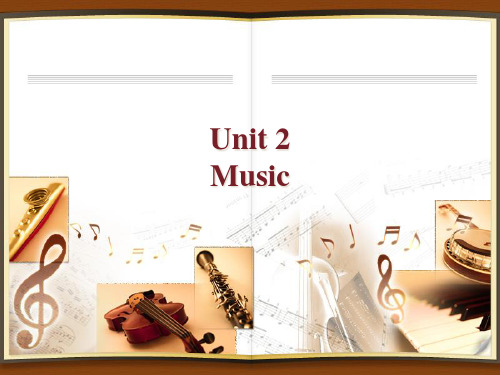
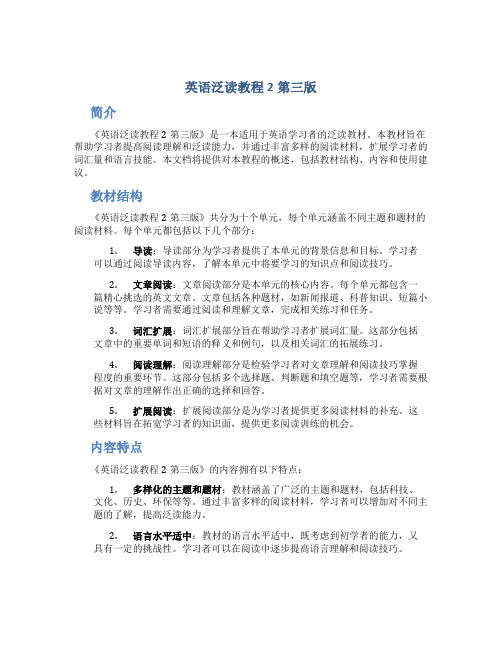
英语泛读教程2第三版简介《英语泛读教程2第三版》是一本适用于英语学习者的泛读教材。
本教材旨在帮助学习者提高阅读理解和泛读能力,并通过丰富多样的阅读材料,扩展学习者的词汇量和语言技能。
本文档将提供对本教程的概述,包括教材结构、内容和使用建议。
教材结构《英语泛读教程2第三版》共分为十个单元,每个单元涵盖不同主题和题材的阅读材料。
每个单元都包括以下几个部分:1.导读:导读部分为学习者提供了本单元的背景信息和目标。
学习者可以通过阅读导读内容,了解本单元中将要学习的知识点和阅读技巧。
2.文章阅读:文章阅读部分是本单元的核心内容。
每个单元都包含一篇精心挑选的英文文章。
文章包括各种题材,如新闻报道、科普知识、短篇小说等等。
学习者需要通过阅读和理解文章,完成相关练习和任务。
3.词汇扩展:词汇扩展部分旨在帮助学习者扩展词汇量。
这部分包括文章中的重要单词和短语的释义和例句,以及相关词汇的拓展练习。
4.阅读理解:阅读理解部分是检验学习者对文章理解和阅读技巧掌握程度的重要环节。
这部分包括多个选择题、判断题和填空题等,学习者需要根据对文章的理解作出正确的选择和回答。
5.扩展阅读:扩展阅读部分是为学习者提供更多阅读材料的补充。
这些材料旨在拓宽学习者的知识面,提供更多阅读训练的机会。
内容特点《英语泛读教程2第三版》的内容拥有以下特点:1.多样化的主题和题材:教材涵盖了广泛的主题和题材,包括科技、文化、历史、环保等等。
通过丰富多样的阅读材料,学习者可以增加对不同主题的了解,提高泛读能力。
2.语言水平适中:教材的语言水平适中,既考虑到初学者的能力,又具有一定的挑战性。
学习者可以在阅读中逐步提高语言理解和阅读技巧。
3.重视词汇扩展:教材注重词汇扩展,在词汇扩展部分提供了详细的释义和例句,帮助学习者更好地理解词汇使用和搭配。
通过词汇扩展练习,学习者可以巩固所学词汇。
4.多样化的练习形式:教材中的阅读理解部分提供了多种练习形式,如选择题、判断题、填空题等,帮助学习者全面提升阅读理解能力。

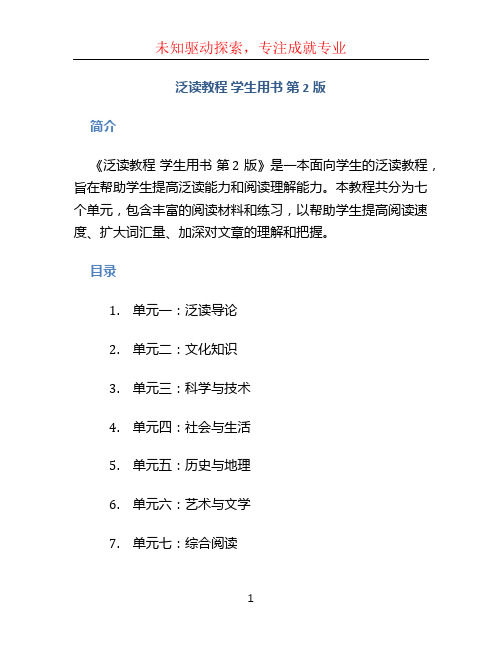
泛读教程学生用书第2版简介《泛读教程学生用书第2版》是一本面向学生的泛读教程,旨在帮助学生提高泛读能力和阅读理解能力。
本教程共分为七个单元,包含丰富的阅读材料和练习,以帮助学生提高阅读速度、扩大词汇量、加深对文章的理解和把握。
目录1.单元一:泛读导论2.单元二:文化知识3.单元三:科学与技术4.单元四:社会与生活5.单元五:历史与地理6.单元六:艺术与文学7.单元七:综合阅读单元简介单元一:泛读导论本单元旨在帮助学生了解泛读的意义和目标,培养学生对泛读的兴趣,并提供一些基本的泛读技巧。
学生将通过阅读一些简短的文章,了解如何快速浏览和理解文章的主要内容。
单元二:文化知识本单元主要介绍一些有关不同国家和文化的知识。
学生将通过阅读一些关于历史、传统、习俗、节日等方面的文章,了解不同文化之间的差异和相似之处。
单元三:科学与技术本单元介绍一些与科学和技术相关的话题。
学生将通过阅读一些与科学实验、新发明、科技应用等方面相关的文章,了解科学与技术对现代社会的影响和作用。
单元四:社会与生活本单元主要介绍一些有关社会和生活的话题。
学生将通过阅读一些关于社会问题、生活方式、健康、教育等方面的文章,了解社会与生活的现状和变化。
单元五:历史与地理本单元介绍一些有关历史和地理的知识。
学生将通过阅读一些关于历史事件、地理景观、城市发展等方面的文章,了解历史发展和地理环境对人类社会的影响。
单元六:艺术与文学本单元主要介绍一些有关艺术和文学的话题。
学生将通过阅读一些关于艺术作品、文学作品、音乐、电影等方面的文章,了解艺术和文学对人类文化的贡献和影响。
单元七:综合阅读本单元将综合前面单元的内容,提供一些综合性的文章和阅读材料。
学生将通过阅读这些文章,综合运用之前学到的泛读技巧和阅读理解能力,全面提升自己的阅读能力。
结语《泛读教程学生用书第2版》是一本适用于学生的泛读教程,通过丰富的阅读材料和练习,帮助学生提高泛读能力和阅读理解能力。

Extensive Reading (Book 2)Unit 1 The Shadowland of DreamsI. Teaching ObjectivesGo over the whole text in limited time and try to get the main idea of the passageGet some information about the author Master the Reading skillsII. Teaching Importance and Difficulties1. The usage of new words and phrases2. Using context clues to find out the meaning of words3. Understanding paragraphs-How to identify the Main Idea.4. Reading skills: Using the DictionaryIII. Teaching Methods: Discussing, Practicing, and Exercising.IV. Teaching Time: 4 periodsV. Teaching Content1. Lead-inWhat are your dreams?What will you do if you meet some troubles on the course of realizing your dream? 2. Related information1) author亚历克斯•哈利(1921-1992)Alexander Murray Palmer Haley (August 11, 1921-February 10, 1992) was an American writer. He is best known as the author of Roots. 非洲裔的美国作家。
他以根据自己家族史完成的小说《根》。
Haley was born in Ithaca, New York, on August 11, 1921, and was the oldest of three brothers and a sister. Haley lived with his family in Henning, Tennessee before returning to Ithaca with his family when he was five years old. Haley’s father was Simon Haley, a professor of agriculture at Alabama A&M University, and his mother was Bertha George Haley (née Palmer) who was from Henning. The younger Haley always spoke proudly of his father and the obstacles of racism he had overcome. After retiring from the Coast Guard, Haley began his writing career, and eventually became a senior editor for Reader’s Digest.2) RootsThe novel, loosely based on Haley’s own family, presented an interpretation of the journey of African Americans from their homeland to the US and the subsequent search for freedom and dignity. 《根》的主题,美国的黑人奴隶制问题,是美国历史上持续最久、争论最烈的一个论题。
涉及美国种族问题的文学作品里,有三部称得上是鼎鼎大名:《汤姆大叔的小屋》uncle tom’s cabin is an anti-slavery novel by American author Harriet Beecher Stowe. Published in 1852, 《飘》(Gone with the Wind)是一部出版于1936年的美国小说,作者为Margaret Mitchell玛格丽特•米切尔,在1937年获得普利策奖。
3) The Pulitzer Prize is a U.S. award for achievements in newspaper and online journalism, literature and musical composition. It was established in 1917 by provisions in the will of American (Hungarian-born) publisher Joseph Pulitzer, and is administered by Columbia University in New York City. Prizes are awarded yearly in twenty-one categories. In twenty of these, each winner receives a certificate and aUS$10,000 cash award. The winner in the public service category of the journalism competition is awarded a gold medal.3. Contents AnalysisMain idea: In the text, by explaining the difference between wanting to become a writer & wanting to write, the author first suggests to those who want to become professional writers that being a writer does not just mean wealth and fame, but also the long periods of neglect & poverty. Then he tells about his struggle to stick to his dream of winning his final success. Finally he draws the conclusion that one must learn to struggle in the shadowland of dreams in order to become successful & one should never forget the courage & persistence it takes to stay the course in the shadowland even after success.Part I (para.1): the difference between―being a writer and writing.Part II (para. 2–3rd para.): author’s own hard life experience before becoming a famous writerPart III (last 4 paras): lesson drawn from his own writing career: courage & persistence are needed for becoming a successful writer.4. Words and PhrasesCherish: keep fondly in mind 充满感情地怀有Fond: cherished 珍爱的Longing: earnest desireRequite: reward, give … in returnProspect: chances of future success 前途Superintendent: manager(大楼的)管理人down-home: of, relating to, or reminiscent (怀旧的)of a simple, wholesome, unpretentious lifestyle, esp. that associated with the rural southern United States乡土的,田园生活的,尤指美国南方乡村的生活方式stay the course: to endure or persist 持续到底VI. Assignment:1. To remember key words and expressions in Text A.2. Home readingUnit 2 Critical ThinkingI. Teaching Objectives(教学目标)1. Go over the whole text in limited time and try to get the main idea of the passage2. Get some information about Critical Thinking in daily life and education.3. Master the Reading skillsII. Teaching Importance and Difficulties1. The usage of new words and phrases2. Using context clues to find out the meaning of words3. Understanding paragraphs-How to identify the Main Idea.4. Reading skills: Dealing with Synonyms and AntonymsIII. Teaching Method: Teaching, Discussing, PracticingIV. Teaching Time: 4 periodsV. Teaching Content1. Lead- in Questions:Have you heard of critical thinking?What are some of the obstacles to the development of critical thinking?2. V ocabulary in contextHercules: In Greek myth, Hercules proved his courage and strength by completing 12 very difficult tasks.Undermine: (vt.) make sth weaker; weakens 破坏;侵蚀基础;暗中破坏;冲蚀,削弱Synonyms: Weaken, worsen, demoralize, destroySomewhere around: approximately3. Text ComprehensionIn college education and in daily life, critical thinking is of vital importance. Richard Paul, in the following section, gives an enlightening discussion of the issue.Part 1 (para1-2) definitions of CTPart 2. (para 3) current situation-many people ignore CTPart 3 (para 4-6) we need thinking more comprehensively (eg. control culture)Part 4(para 7) our task-a critical societyPart 5 (para 8-10) barriers to CTPart 6 (para 11-12) what we should do-be historical thinkers.Part 7(para13-15) standards to assess CT (eg. Doctor’s malpractice)Part 8(para 16-17)conclusion: we need CT.VI. Assignment:1. To remember key words and expressions in Text A.2. Home readingUnit 3 RecyclingI. Teaching ObjectivesGo over the whole text in limited time and try to get the main idea of the passage Getting to know some information about recycling in USA and our country.II. Teaching Importance and Difficulties1. The usage of new words and phrases2. Using context clues to find out the meaning of wordsIII. Teaching Methods: Teaching, Discussing and PracticingIV. Teaching Time: 4 periodsV. Teaching Content1. Related InformationRecycling involves processing used materials into new products to prevent waste of potentially useful materials, reduce the consumption of fresh raw materials, reduce energy usage, reduce air pollution (from incineration) and water pollution.2. Lead-in question:What is the significance of recycling?3. V ocabulary in contextFact sheet: a piece of paper giving information about a subject 资料页Compost: make … into compost 把…制成堆肥Fad: something that people are interested in for only a short period of timeScrapped: junkyard 废品场Rock-bottom: the lowest pointVI. Assignment:1. To remember key words and expressions in Text A.2. Home readingUnit 4 The Lady on Pemberton StreetI. Teaching ObjectivesGo over the whole text in limited time and try to get the main idea of the passage II. Teaching Importance and Difficulties1. The usage of new words and phrases2. Using context clues to find out the meaning of words3. Understanding paragraphs-How to identify the Main Idea.III. Teaching Methods: Teaching, Discussing and PracticingIV. Teaching Time: 4 periodsV. Teaching Content1. Lead-in question:Do you know what a block captain is? (a person who asks for city services, reports trouble to police and coordinates efforts to keep the block clean and safe)What is your impression of them?2. V ocabulary in contextRow house: terraced house (one of a row of houses that are joined together on each side) 一栋排房Vial: phial 小玻璃瓶Flier: flyer 传单Be in sb’s debt: feel grateful to sb for their help 欠某人的情,感激某人Sheaf: a number of pieces of paper tied or held together 一叠,一沓Self-conscious: embarrassed and nervous 不自然的VI. Assignment:1. To remember key words and expressions in Text A.2. Home readingUnit 5 A Mother’s PlaceI. Teaching ObjectivesGo over the whole text in limited time and try to get the main idea of the passage II. Teaching Importance and Difficulties1. The usage of new words and phrases2. Using context clues to find out the meaning of wordsIII. Teaching Methods: Teaching, Discussing and PracticingIV. Teaching Time: 4 periodsV. Teaching Content1. Lead-in questions:Do children still need their parents after getting married?Should they live together in the same house?2. V ocabulary in contextDownpour: heavy rainBlow up: (AmE) an occasion when somebody suddenly becomes angryStump: walk in a heavy and angry wayTo that effect: 有那个意思Square one’s shoulders: make the back and shoulders straight to show he/she is ready 挺直身子,挺起胸膛Trailer: (AmE) a vehicle without an engine, that can be pulled by a car or truck or used as a home (拖车式)活动房屋VI. Assignment:1. To remember key words and expressions in Text A.2. Home readingUnit 6 Fathers & Sons: the Bonding ProcessI. Teaching ObjectivesGo over the whole text in limited time and try to get the main idea of the passage II. Teaching Importance and Difficulties1. The usage of new words and phrases2. Using context clues to find out the meaning of wordsIII. Teaching Methods: Teaching, Discussing and PracticingIV. Teaching Time: 4 periodsV. Teaching Content1. Lead-in questions:What do you think makes a good father?What should be the relationship between fathers and daughters?2. V ocabulary in contextRolled into one: combined in one person or thing 集于一身Instill: (~ sth in sb) gradually make sb feel or think 逐步培养,灌输in abundance: in large quantitiesdeadbeat: (infml) a lazy person; a person with no job and no money 身无分文的无业者VI. Assignment:1. To remember key words and expressions in Text A.2. Home readingUnit 7 Numbers and OmensI. Teaching ObjectivesGo over the whole text in limited time and try to get the main idea of the passage II. Teaching Importance and Difficulties1. The usage of new words and phrases2. Using context clues to find out the meaning of wordsIII. Teaching Methods: Teaching, Discussing and PracticingIV. Teaching Time: 4 periodsV. Teaching Content1. Lead-in questions:What is the significance of numbers in your life?Do you think that faith in numbers is superstitious? Why or why not?2. V ocabulary in contextOmen: a sign of what is going to happen in the futureChew out: scold; speak angrily to 严厉责备Halo: corona (a ring of light seen around the sun or moon) 日华,月华Betrothal: having promised to marry sb; engagement 订婚Unbiased: impartial; fair and not influenced by sb’s opinions 不偏不倚的VI. Assignment:1. To remember key words and expressions in Text A.2. Home readingUnit 8 Getting Enough Sleep? Dream onI. Teaching ObjectivesGo over the whole text in limited time and try to get the main idea of the passage II. Teaching Importance and Difficulties1. The usage of new words and phrases2. Using context clues to find out the meaning of words3. Understanding paragraphs-How to identify the Main Idea.III. Teaching Methods: Teaching, Discussing and PracticingIV. Teaching Time: 4 periodsV. Teaching Content1. Lead-in questions:Do you get enough sleep every day?Have you suffered any sleeping problems?2. V ocabulary in contextGo to great lengths: put a lot of effort 不遗余力Odd hours: not very regular hoursDeceive: make somebody believe something that is not trueVivacious: lively 活泼的Optimally: perfectly; ideally; bestAmass: accumulateVI. Assignment:1. To remember key words and expressions in Text A.2. Home readingUnit 9 Invented WordsI. Teaching ObjectivesGo over the whole text in limited time and try to get the main idea of the passage II. Teaching Importance and Difficulties1. The usage of new words and phrases2. Using context clues to find out the meaning of words3. Understanding paragraphs-How to identify the Main Idea.III. Teaching Methods: Teaching, Discussing and PracticingIV. Teaching Time: 4 periodsV. Teaching Content1. Lead-in question:Do you know how new words are born in English?2. V ocabulary in contextMilkshake: a drink made of milk, ice cream with an added flavour of fruit or chocolate 奶昔Keep track of: have information about 了解…动态VI. Assignment:1. To remember key words and expressions in Text A.2. Home readingUnit 10 Nuclear EnergyI. Teaching ObjectivesGo over the whole text in limited time and try to get the main idea of the passage II. Teaching Importance and Difficulties1. The usage of new words and phrases2. Using context clues to find out the meaning of words3. Understanding facts and opinionsIII. Teaching Methods: Teaching, Discussing and PracticingIV. Teaching Time: 4 periodsV. Teaching Content1. Lead-in question:Do you know the way nuclear energy is produced?2. V ocabulary in contextEquilibrium: a state of balance, especially between two opposing forces 均势Spin: (v.) make … turn round quicklyEntail: involve something that can’t be avoided 牵涉Dog: (v.) follow somebody closely 尾随Meltdown: a serious accident in which the central part of a nuclear reactor melts, causing harmful radiation to escape 核反应堆核心熔毁Cleanup: (n.) the process of removing pollutionRepository: a place where a large number of things can be kept 存放处Narrowly: only by a small amount 勉强地;以微弱优势地VI. Assignment:1. To remember key words and expressions in Text A.2. Home readingUnit 11 The Rocking-Horse Winner (I)I. Teaching ObjectivesGo over the whole text in limited time and try to get the main idea of the passage Get some information about the D. H. Lawrence and his major works.Master the Reading skills: making inferencesII. Teaching Importance and Difficulties1. The usage of new words and phrases2. Understanding paragraphs-How to analyze the theme of the text.3. Reading skills: making inferencesIII. Teaching Methods: Teaching, Discussing, PracticingIV. Teaching Time: 6 periodsV. Teaching Content(教学内容)1. Related informationAuthor: D. H. Lawrence (1885-1930) an English novelist, poet, playwright, literary critic and painter. D. H. Lawrence was born in Easter wood, Nottinghamshire (诺丁汉郡). His father was a barely literate miner, and his mother was a middle-class woman and a school teacher, and had a deep influence upon his life.After receiving education at local schools and at Nottingham University College, Lawrence worked for a time as a teacher. In the meantime, he began to write and publish literary works.2. V ocabulary in the textIn style: in an impressive way 气派地,隆重地Nursery: a room in a house where young children can play 儿童室3. Character Analysis➢Young Paul—innocent, sensitive, responsible and unselfish.➢the mother—a cold, unfeeling, greedy, materialistic woman disguised in the cover of a loving mother and wife;➢Uncle Oscar—an unscrupulous (不讲道德)man who takes advantage of his nephew’s supernatural talents to his own advantage, without considering for a moment the pressures such activity may place upon the young boy.➢English gardener—he is passive, loyal, a little bit afraid of his superiors, and somewhat greedy to the extent.VI. Assignment:1. To remember key words and expressions in Text A.2. Home readingUnit 12 Social critic with VerveI. Teaching ObjectivesGo over the whole text in limited time and try to get the main idea of the passageII. Teaching Importance and Difficulties1. The usage of new words and phrases2. Using context clues to find out the meaning of words3. Understanding paragraphs-How to identify the Main Idea.III. Teaching Methods: Teaching, Discussing and PracticingIV. Teaching Time: 6 periodsV. Teaching Content1. Lead-in questions:Have you heard of Ms. Sontag?What were the major achievements made by Ms. Sontag?2. V ocabulary in contextVI. Assignment:1. To remember key words and expressions in Text A.2. Home readingUnit 13 Giving Hitler Hell (I)I. Teaching ObjectivesGo over the whole text in limited time and try to get the main idea of the passage II. Teaching Importance and Difficulties1. The usage of new words and phrases2. Using context clues to find out the meaning of words3. Understanding paragraphs-How to identify the Main Idea.III. Teaching Methods: Teaching, Discussing and PracticingIV. Teaching Time: 6 periodsV. Teaching Content1. Lead-in question:What do you know about Hitler?2. V ocabulary in contextVI. Assignment:1. To remember key words and expressions in Text A.2. Home readingUnit 14 Overdue InterestI. Teaching ObjectivesGo over the whole text in limited time and try to get the main idea of the passage II. Teaching Importance and Difficulties1. The usage of new words and phrases2. Using context clues to find out the meaning of words3. Understanding paragraphs-How to identify the Main Idea.III. Teaching Methods: Teaching, Discussing and PracticingIV. Teaching Time: 6 periodsV. Teaching Content1. Lead-in question:Why should we Chinese always remember the Nanjing Massacre?2. V ocabulary in contextVI. Assignment:1. To remember key words and expressions in Text A.2. Home readingUnit 15 The Old Man and the Sea (I)I. Teaching ObjectivesGo over the whole text in limited time and try to get the main idea of the passage II. Teaching Importance and Difficulties1. The usage of new words and phrases2. Using context clues to find out the meaning of words3. Understanding paragraphs-How to identify the Main Idea.III. Teaching Methods: Teaching, Discussing and PracticingIV. Teaching Time: 6 periodsV. Teaching Content1. Lead-in questions:Have you read the Old Man and the Sea? Discuss the friendship between the old man and the boy.2. V ocabulary in contextVI. Assignment:1. To remember key words and expressions in Text A.2. Home reading课程教材:《英语泛读教程2》,第三版,高等教育出版社:2011年出版。